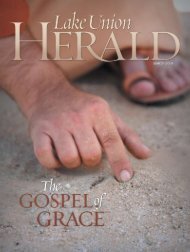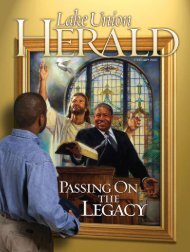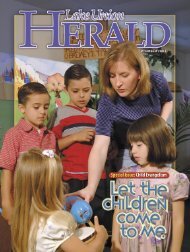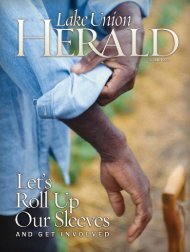August - Lake Union Conference - General Conference of Seventh ...
August - Lake Union Conference - General Conference of Seventh ...
August - Lake Union Conference - General Conference of Seventh ...
You also want an ePaper? Increase the reach of your titles
YUMPU automatically turns print PDFs into web optimized ePapers that Google loves.
efforts to be safe and encourage procedures to be put into<br />
place so that trust in all areas <strong>of</strong> leadership is warranted and<br />
undamaged. For when trust is broken, it not only damages<br />
individual lives but ministry as well.<br />
Proverbs 2 provides an excellent foundation for the wisdom<br />
that is needed for spiritually safe individuals, churches<br />
and schools: “For the Lord gives wisdom, and from his mouth<br />
come knowledge and understanding. He holds victory in<br />
store for the upright, he is a shield to those whose walk is<br />
blameless for he guards the course <strong>of</strong> the just and protects<br />
the way <strong>of</strong> his faithful ones. Then you will understand what<br />
is right and just and fair—every good path. For wisdom will<br />
enter your heart. ... Discretion will protect you, and understanding<br />
will guard you...” (Proverbs 2:6–11 NIV).<br />
Our churches and schools need to have a positive, joyous<br />
and safe atmosphere. Without a surrounding influence <strong>of</strong><br />
trust, the emotional effect <strong>of</strong> all other attributes will be hindered.<br />
This cannot be compromised. The study <strong>of</strong> the spiritual<br />
embodiment <strong>of</strong> the life and ministry <strong>of</strong> Jesus Christ<br />
will provide what is necessary to obtain this holy effect.<br />
Jesus said, “Let the little children come to me, and do not<br />
hinder them, for the kingdom <strong>of</strong> heaven belongs to such as<br />
these” (Matthew 19:14 NIV).<br />
Barbara Livesay is an associate superintendent <strong>of</strong> education for the <strong>Lake</strong><br />
<strong>Union</strong> <strong>Conference</strong> specializing in early childhood education, and an associate<br />
director <strong>of</strong> risk management/human resources.<br />
1. White, Ellen G, “Sabbath-School Influences,” The Sabbath-School Worker,<br />
Michigan: Review and Herald Publishing Association, April 1, 1886.<br />
church leaders and members must themselves live by a strict<br />
code <strong>of</strong> ethics that precludes even the appearance <strong>of</strong> evil<br />
as regards the exploitation <strong>of</strong> minors for the gratification<br />
<strong>of</strong> adult desires. Other practical measures toward making<br />
church a safe place for children include attention to the safety<br />
<strong>of</strong> the church facility and its surroundings and the careful<br />
supervision and monitoring <strong>of</strong> children and their environment<br />
during all church-related activities. Education regarding<br />
what constitutes appropriate and inappropriate interaction<br />
between adults and children, the warning signs <strong>of</strong> abuse<br />
and violence, and the specific steps to be followed should<br />
inappropriate behavior be reported or suspected are vitally<br />
important. Pastors and church leaders who are visible and<br />
approachable play an important role in prevention as well as<br />
in responding well to the needs <strong>of</strong> children whose safety may<br />
have been jeopardized. Regular updates are needed regarding<br />
their moral and legal responsibility to report child abuse<br />
to appropriate civil authorities. The designation <strong>of</strong> trained<br />
personnel and specific protocols at wider levels <strong>of</strong> Church<br />
organization will help to ensure appropriate action and followthrough<br />
when abuse is reported within the church setting.<br />
Because <strong>of</strong> the complex nature <strong>of</strong> the problem <strong>of</strong> child<br />
sexual abuse and violence against children, intervention and<br />
treatment <strong>of</strong> perpetrators requires resources beyond the<br />
scope <strong>of</strong> ministry provided by the local church. However,<br />
the presence <strong>of</strong> a known perpetrator in a congregation calls<br />
for the highest levels <strong>of</strong> vigilance. While perpetrators should<br />
be held fully responsible for their own behavior, the supervision<br />
<strong>of</strong> persons with a history <strong>of</strong> inappropriate behavior is<br />
necessary to ensure that such persons maintain appropriate<br />
distance and refrain from all contact with children during<br />
church-related activities. Provision for alternative opportunities<br />
for perpetrators to grow spiritually in settings where<br />
children are not present greatly enhances child protection.<br />
Fostering Emotional and<br />
Spiritual Healing<br />
Children who have been personally victimized or who<br />
have witnessed disturbing events need the care <strong>of</strong> adults<br />
who treat them with sensitivity and understanding. Practical<br />
support that helps children and families maintain stability<br />
in the midst <strong>of</strong> turmoil empowers victims and their families<br />
and promotes healing. The Church’s commitment to breaking<br />
the silence frequently associated with child sexual abuse<br />
and violence, its efforts toward advocacy and justice for all<br />
victims, and deliberate action to safeguard children from all<br />
forms <strong>of</strong> abuse and violence will contribute much toward<br />
the emotional and spiritual recovery <strong>of</strong> all concerned. The<br />
Church regards the nurture and protection <strong>of</strong> children as a<br />
sacred trust.<br />
(This statement has been informed by the principles expressed<br />
in the following biblical passages: Lev. 18:6; 2 Sam.<br />
13:1–11; 1 Kings 17:17–23; Ps. 9:9, 12, 16-18; 11:5–7; 22:24;<br />
34:18; 127:3–5; 128:3–4; Prov. 31:8–9; Is. 1:16–17; Jer. 22:3;<br />
Matt. 18:1–6; 21:9, 15–16; Mark 9:37; 10:13–16; Eph. 6:4; Col.<br />
3:21; 1 Tim. 5:8; Heb.13:3.) (See also “Statement on Ending<br />
Violence Against Women and Children,” http://adventist.<br />
org/beliefs/statements/violence.html.)<br />
Vi s i t w w w. L a k e Un i o n He r a l d . o r g L a k e U n i o n H e r a l d • Au g u s t 2 0 1 0 | 23
















